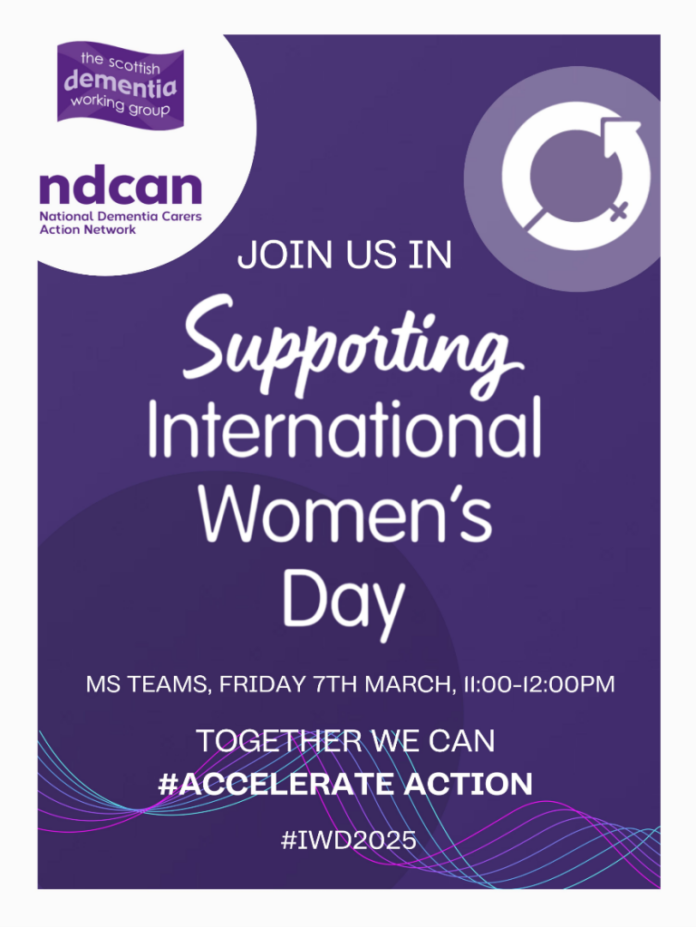Occupational Therapy Student Reflections
Hello, we are final-year occupational therapy students at Queen Margaret University, currently completing our final placement with Alzheimer Scotland. We had the privilege of participating in “Feel Good Friday” alongside the Active Voice Members (Scottish Dementia Working Group and National Dementia Carers Action Network). The discussions during this meeting were immensely inspiring, and we wanted to take a moment to share our reflections.
Thea’s blog is a powerful and necessary call to action, shedding light on an issue that has long been whispered about but deserves to be shouted from the rooftops—women’s brain health. Her heartfelt and well-researched piece not only highlights the alarming statistics surrounding dementia in women but also exposes the significant gaps in government policies that fail to address this critical issue. You can read Theas blog here
The importance of International Women’s Day (IWD) is reflected beautifully in Thea’s work. While IWD is a time to celebrate women’s achievements, it is also an opportunity to demand action on gender disparities, particularly in healthcare. The impact of dementia on women—whether as individuals living with the condition, unpaid caregivers, or frontline workers in the care sector—demonstrates why this conversation can no longer be ignored. Thea’s writing embodies the true spirit of International Women’s Day: raising awareness, demanding change, and ensuring that women’s voices are heard. If we are to truly honour this day, we must listen to women like Thea and join the fight for better healthcare policies and support systems for women affected by dementia. In celebration of International Women’s Day, Active Voice Members hosted Feel Good Friday, an event open to all the incredible women working within their teams in Alzheimer Scotland. This provided a valuable space to discuss ongoing efforts surrounding women’s brain health and to recognise the contributions of those involved in key working groups. The session also encouraged participants to reflect on what makes them proud to be a woman. Some inspiring examples shared included:
“I am really proud of the fact that I am raising a very independent feminist.”
“I work part-time while managing assignments and placements, and I’m proud of myself for that.”
“I am so proud to have so many amazing, strong women in my life and to surround myself with them.”
“I was one of the first film editors at Grampian Television, and I am really proud of that.”
“I am very proud of my daughter, who is an apprentice mechanic, and that she is growing into a strong, independent woman.”
importance of spaces where women can share their experiences, celebrate achievements, and support one another.
Despite the vital discussions taking place within Alzheimer Scotland and other organisations, it remains deeply concerning that Women’s Brain Health was not identified as a priority in the next Women’s Health Plan. Instead, the focus has shifted toward gynaecology, pelvic health, and ageing well, specifically in relation to bone health. This omission is particularly disappointing given the ongoing efforts of the National Dementia Carers Action Network (NDCAN)*, which has prioritised brain health and research as key areas for action.
The Scottish Government first published its Women’s Health Plan in 2021 as a roadmap for improving women’s health outcomes. However, despite opportunities to update the plan since its release, there remains a glaring absence of any mention of women’s brain health. This is a pressing concern, considering that dementia is the leading cause of death for women in Scotland. The question remains: why has this critical issue been overlooked?
During our discussions, it was noted that the plan appears to focus primarily on girls and younger women, with a reluctance to address ageing explicitly. Instead, the term “optimising future health” is used, which, while positive in tone, seems to sidestep the reality of ageing. One participant expressed frustration with this approach, stating:
“As an older woman, I am concerned that I am not being recognised or accepted as important. Women get older. It is a fact of life. And women mostly live longer than men.”
This highlights the need for a shift in how women’s health is framed—acknowledging ageing as a natural and important stage of life rather than avoiding the conversation altogether. If women’s health is truly a priority, then women’s brain health must be recognised as a key component of that discussion.
It is crucial not only on International Women’s Day, that we acknowledge the invaluable role of unpaid carers, the majority of whom are women. According to the 2023-24 Scottish Carers Census, approximately 73% of carers were female, a figure consistent with the previous year. Many of these women balance employment, family responsibilities, and personal well-being, yet this essential work often comes at a significant cost to their own health.
In Scotland, the Carers Parliament provides unpaid carers with a platform to share their experiences and influence policy, while organisations such as the Coalition of Carers continue to advocate for improved financial support and access to resources. Members of NDCAN regularly share powerful testimonies about the realities of caring for someone with dementia. Their stories reinforce the urgent need for greater recognition and support for carers, who play an essential yet often undervalued role in society.
As we marked this International Women’s Day, let’s not only celebrate the achievements of women on this day, but celebrate and amplify the voices of carers, advocate for policy changes every day, and push for a healthcare system that fully supports those dedicating their lives to caring for others.
Contributors
Thank you for reading this blog, this first of many during our occupational therapy student placement at where we will be sharing our time, learning and reflections at Alzheimer Scotland with the Scottish Dementia Working Group and National Dementia Carers Action Network.

Emma Wall and Hannah Moore, occupational therapy students at Queen Margaret University, Edinburgh.


